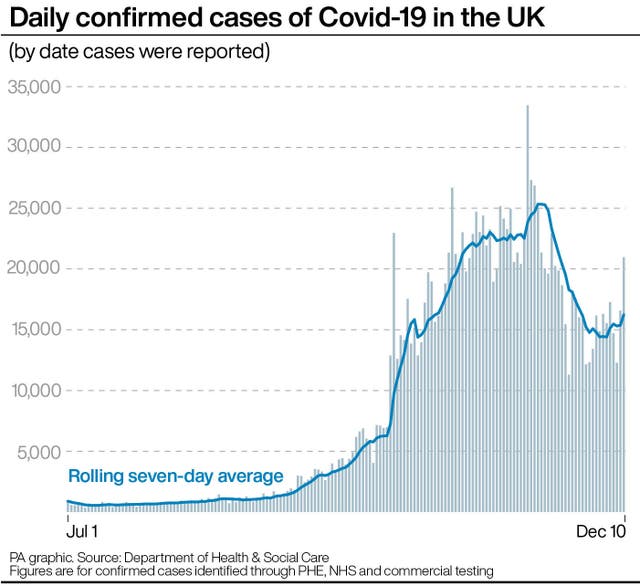Self-isolation for Covid-19 contacts and international arrivals cut to 10 days
Health chiefs said following a review of data they were “confident” that the self-isolation period could be shortened.

The self-isolation period for contacts of a positive coronavirus case will be cut from 14 days to 10 days, the UK’s chief medical officers have announced.
Those required to quarantine after returning from countries which are not on the travel corridor list will also see their isolation period reduced, in an approach agreed by all four nations.
Health chiefs said in a joint statement that following a review of the evidence, they were “confident” that the self-isolation period could be shortened.
It comes as the weekly surveillance survey by the Office for National Statistics (ONS) found that the proportion of people testing positive for Covid-19 is estimated to have increased in London.
There are early signs that rates may have increased in eastern England, according to the ONS, while rates have decreased in all other regions.
Elsewhere on Friday, the reproduction number, or R value, of coronavirus transmission across the UK is now between 0.9 and 1, the Government Office for Science and the Scientific Advisory Group for Emergencies (Sage) said.
This is a slight increase from last week, when it was estimated to be between 0.8 and 1.
Changes to the self-isolation period already apply in Wales following an announcement by the Welsh Government earlier this week, while they will take effect in England, Scotland and Northern Ireland from Monday.
The new rules will apply to all those who are currently self-isolating, including those who began doing so before Monday.
“Self-isolation is essential to reducing the spread of Covid as it breaks the chains of transmission,” a joint statement by the health chiefs said.
“After reviewing the evidence, we are now confident that we can reduce the number of days that contacts self-isolate from 14 days to 10 days.
“People who return from countries which are not on the travel corridor list should also self-isolate for 10 days instead of 14 days.”
They said those who test positive for Covid-19 should continue to self-isolate for 10 days from the onset of symptoms, or from taking a positive test if asymptomatic.
“We urge everyone to self-isolate when appropriate, it will save lives,” they added.
The joint statement was issued by England’s chief medical officer Professor Chris Whitty, Scotland’s interim chief medical officer Dr Gregor Smith, Northern Ireland’s chief medical officer Dr Michael McBride and Wales’ chief medical officer Dr Frank Atherton.

People are most infectious in the first two days before developing symptoms, if they are symptomatic, and for a small number of days afterwards.
But by day 10, only around one to two people in 100 are likely to still be capable of passing on the virus to others, according to experts.
Despite the changes to self-isolation, people are still advised to avoid high-risk activities when this period ends due to a residual risk of being infectious.
England’s deputy chief medical officer Dr Jenny Harries said the decision was based on a “continuous accumulation of evidence” throughout the pandemic.
“And all of those combined together showed that the tail-end of infectiousness, if you like, is the one where an individual is least likely to transmit infection,” she told reporters.

“So allowing somebody out of self-isolation a short time earlier than that is a reasonable balance between managing the risk to the public but allowing us not to intrude on their lives.”
NHS Test and Trace will tell people to self-isolate for 10 days from Monday, but due to the time taken to develop technical changes, the NHS Covid-19 app will only do the same from Thursday.
Those who receive a notification to self-isolate on the app prior to Thursday will be able to end their quarantine when the countdown timer says there are three days left.
Meanwhile, testing pilots are under way to examine if the self-isolation period could be scrapped entirely in the new year.
In a pilot in Liverpool, contacts of a confirmed coronavirus case are to be tested daily for a period after exposure and are not asked to self-isolate unless they test positive for the virus.
This approach could be adopted nationwide in early 2021 dependent on the success of the pilots.
According to the ONS weekly surveillance survey, modelling suggests infection rates in England remain highest among secondary school-aged children and young adults up to the age of 24.
On Friday, the Government unveiled more details on the areas in England where secondary school and college students will receive coronavirus testing.
Staff, students and families in secondary schools and colleges in parts of north-east London, south Essex and Kent are being urged to get tested.
A further 424 people had died within 28 days of testing positive for Covid-19 as of Friday, the Government said, bringing the total number of UK deaths to 63,506.





